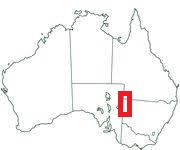
Movie stage XII
| start date | activity | place | from - to | days | km | km/ day | comment |
| 9.09 | Hike | Nundora Stn - Mutawintji NP | 2 | 75 | 38 | High level creeks | |
| 11.09 | Hike | Mutawintji NP - Burke & Wills camp | 4 | 143 | 36 | ||
| 15.09 | Hike | Burke & Wills camp - Menindee | 1 | 22 |
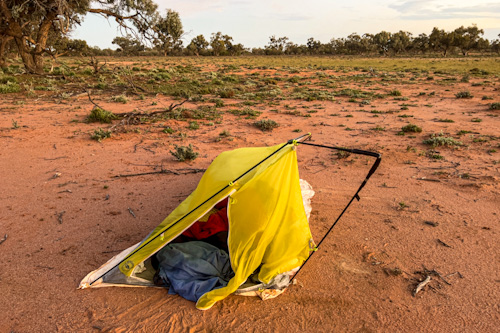 As mentioned in the previous stage, the Cooper River overflowed making it difficult or impossible to get to some places. Stage XII supposed to follow the footsteps of Burke & Wills expedition, but since I could not visit the death's places of both above, I decided to modify the route. From Lake Eyre I crossed the Strzelecki Desert to the southeast, and not as planned to Dig Tree lying to the northeast. Fortunately, starting from the Nundora Station for the next seven days I was already following the footsteps of the mentioned explorers.
As mentioned in the previous stage, the Cooper River overflowed making it difficult or impossible to get to some places. Stage XII supposed to follow the footsteps of Burke & Wills expedition, but since I could not visit the death's places of both above, I decided to modify the route. From Lake Eyre I crossed the Strzelecki Desert to the southeast, and not as planned to Dig Tree lying to the northeast. Fortunately, starting from the Nundora Station for the next seven days I was already following the footsteps of the mentioned explorers.



It's nice to see and imagine how they traveled this way, how they looked for the best route and water, what they hunted for. As in Australia the weather depends on the year - I came across an extremely rainy period, which sometimes turned out to be to my advantage, sometimes opposite. For example, when leaving Nundora Station the owner offered to transfer me by helicopter to the other side of a nearby flowing river - but I cannot use a motor-powered machine on this trip. I had to wait one day for the river to turn back into a creek, and the next morning the crossing was possible, even though the mud was sucking up my sandals. In the end, I somehow reached the other end barefoot, but in the evening 30km further I was stopped by another creek.
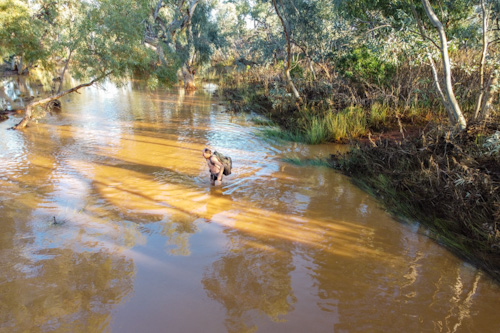
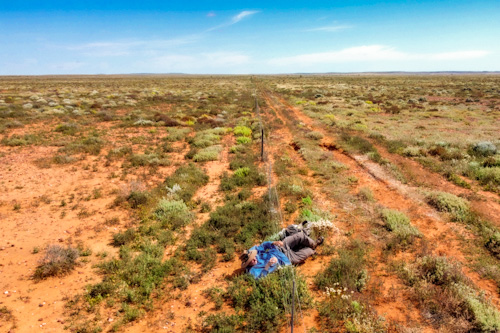
 Eventually I got to the Burke campsite on Lake Pamamaroo, which I personally like very much because of the shape of the branches of the trees sticking out of the water (I've been here 4 times already), and hence the next day was a short stroll to Menindee, a town where explorers also stopped for a while. I visited the pub-hotel where the two of them stopped earlier (the building was rebuilt after the fire).
Eventually I got to the Burke campsite on Lake Pamamaroo, which I personally like very much because of the shape of the branches of the trees sticking out of the water (I've been here 4 times already), and hence the next day was a short stroll to Menindee, a town where explorers also stopped for a while. I visited the pub-hotel where the two of them stopped earlier (the building was rebuilt after the fire).
Extras - a brief history of Burke & Wills expedition.
Melbourne and Adelaide were racing who would first run a telegraph line from the south to the north of the country, so that they could receive and sell world information to the rest of Australia. So it was necessary to find the trail and investigate whether the passage of the interior of the continent is possible at all.
Victoria was then one of the richest cities in the world (gold), so state invested sky-high money to organize the expedition. Robert O'Hara Burke, a policeman with no outback skills well known for getting lost in his own village, was choosen as leader. How it's possible? Just like today connections decided - Burke played cards with people from the Society.
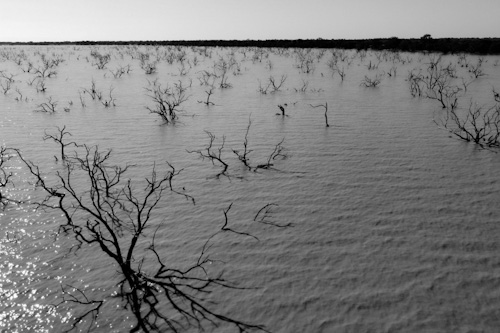

The start day was a big mess, Burke already fired two people before they even left, and the fact that he was carrying an oak table with a full set of chairs, a huge Chinese dong, or 3 tons of sugar with him, will remain incomprehensible. He also preferred horses over camels in desert areas, and hated Aborigines and did not want their help. Apart from his determination to achieve his goal, it's hard to say a good word about him.
Wills later became the second in charge as Burke dismissed his previous assistants. It was thanks to Wills that they knew where they were at all (he was the only navigator). Anyway in Menindee, Burke split the group and continued lighter. When he arrived at the Cooper Creek, he announced that only four people would go further. He took little food, the planned time was unrealistically short, and due to the constant delays he set off for unknown desert areas in January - the middle of summer! Moreover, while crossing the tropic, they found themselves in a humid steamy hot zone in a rainy season. They slept on the ground, they had no tent - I admire the hardships of the journey. Burke reached tide waters in the north - unfortunately, he never saw the open sea (5 km short), because the mangroves effectively prevented access.
 They travelled back extremely hungry and exhausted. One of them was caught stealing rations and died shortly after (it is speculated that Burke helped him to die, but there is no evidence). The group "wasted" whole day for digging a grave and a funeral ceremony. In any case, four days after the funeral, with the rest of their strength the three survivors made it back to the Cooper Creek, but it was abandoned. The group that had waited there and stayed much longer than Burke had told them, but in the end resigned, left the Cooper camp - as it later turned out, a few hours earlier than Burke's return !!!
They travelled back extremely hungry and exhausted. One of them was caught stealing rations and died shortly after (it is speculated that Burke helped him to die, but there is no evidence). The group "wasted" whole day for digging a grave and a funeral ceremony. In any case, four days after the funeral, with the rest of their strength the three survivors made it back to the Cooper Creek, but it was abandoned. The group that had waited there and stayed much longer than Burke had told them, but in the end resigned, left the Cooper camp - as it later turned out, a few hours earlier than Burke's return !!!
The broken explorers digged out the buried letter and food supplies according to the instructions found on the tree (hence the Dig Tree), but they were exhausted and unable to catch up with the group. To make matters worse, only with known motivations to Burke, he did not allow to mark the information on the tree that they were here, and they buried back their letter with the information the wsy that nothing visible could be known about they were there. Finally they moved towards civilization ... but in a new, different direction.
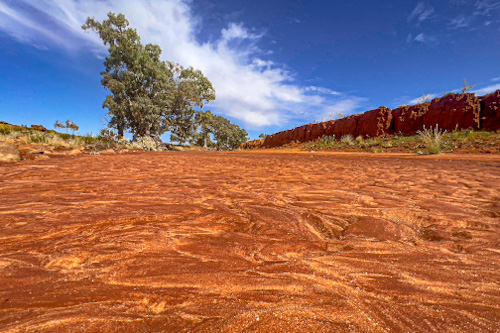 Meanwhile the group retreating from Cooper met a new resupply group headed towards them - the leaders of both groups rode lightly on horseback once more to the Dig Tree - unfortunately they found the place as they had left it, without realizing that Burke had been here a few days earlier. They did not meet them on the way either, because Burke had changed his unfortunate route. The decision was wrong, as usual, but this time with tragic consequences.
Meanwhile the group retreating from Cooper met a new resupply group headed towards them - the leaders of both groups rode lightly on horseback once more to the Dig Tree - unfortunately they found the place as they had left it, without realizing that Burke had been here a few days earlier. They did not meet them on the way either, because Burke had changed his unfortunate route. The decision was wrong, as usual, but this time with tragic consequences.
Meanwhile Burke, Wills, and King were unable to reach South Australia Mt. Hopeless via the new route, so they headed back towards the creek. Unfortunately, they were weak even though they ate some fruits. Burke was shooting towards Aborigines, so he did not find out that these fruits had to be boiled, otherwise they would fade out vitamin B from their bodies. So they got weaker every day. They broke up and Burke and Wills died separately at a similar time. Their personal notes have been preserved. Only King, the camel-driving boy, survived. He was taken care of by the Aborigines, and he was found a few months later by a reascue group.
There were four search parties - from every geographical direction of the continent. In these all groups not a single person died, compared to the seven dead ones in the Burke's expedition. Besides these groups discovered and mapped a huge part of Australia. In conclusion, before this fiasco was over, John Stuart crossed the country north and back south in 1862, thanks to which South Australia won the race and ran a telegraph line towards New Guinea.